On Monday 12 June, Yusuf al-Hoori delivered an intervention in behalf of ADHRB during the 35th session of the Human Rights Council under the Item 3 Interactive Dialogue with the Special Rapporteur on trafficking. In his intervention, al-Hoori raised concerns about Kuwait’s continued use of the kafala system of labor sponsorship. Please continue reading for the full text of his remarks or click here for a PDF of his intervention.
Mr. President,
IDO and Americans for Democracy & Human Rights in Bahrain welcome the Rapporteur on trafficking Giammarinaro’s visit to Kuwait this past September, and share many of the concerns she expressed in her preliminary findings. Among these concerns is the country’s continued use of the kafala system, which ties a migrant’s employment and immigration status to a private Kuwaiti citizen or company. This practice thereby enables employers to monitor the movements of migrant workers, which can in turn facilitate labor exploitation and human trafficking.
We are likewise concerned by Kuwaiti companies’ use of deceptive recruiting techniques, reliance on coercive practices which force workers to pay exorbitant broker fees, and arbitrary contravention of workers’ contracts. Together, these abuses can amount to forced labor, and are deeply linked to the trafficking of both migrant workers and citizens.
Populations that are particularly vulnerable to human trafficking—including, but not limited to, refugees, asylum seekers, and stateless persons—are inadequately protected due largely to the absence of competent legal and institutional mechanisms. Yet even the legislation promulgated by the Kuwaiti government regarding labor protections and minimum wage standards remain systematically unenforced. As Rapporteur Giammarinaro highlights in her preliminary findings, the prosecution of trafficking cases is extremely rare, perpetuating a climate of impunity and the continuation of related abuses like forced labor.
In light of the current situation, we wish to ask Rapporteur Giammarinaro: “What legal, institutional, and policy measures can be taken to ensure the enforcement of existing legislation and the implementation of international agreements in order to effectively combat human trafficking?”
Thank you,





